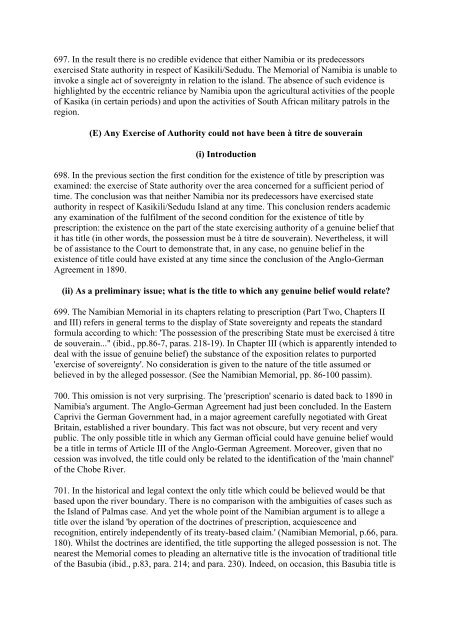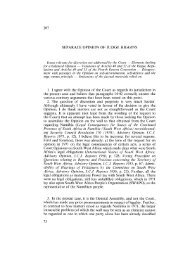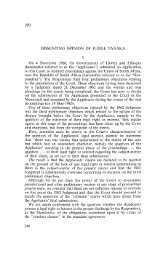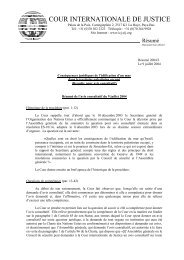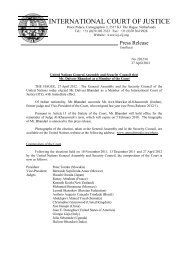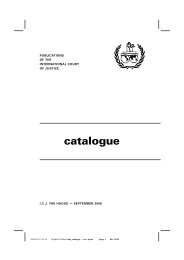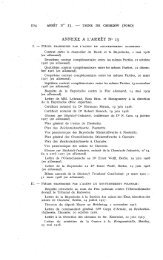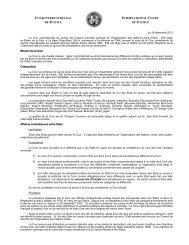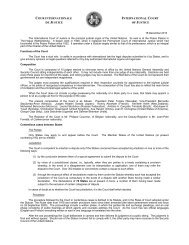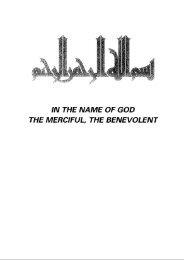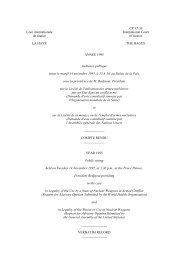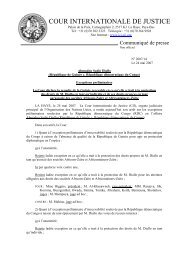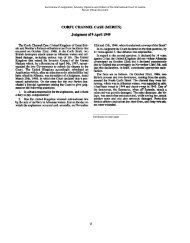botswana/namibia - Cour international de Justice
botswana/namibia - Cour international de Justice
botswana/namibia - Cour international de Justice
You also want an ePaper? Increase the reach of your titles
YUMPU automatically turns print PDFs into web optimized ePapers that Google loves.
697. In the result there is no credible evi<strong>de</strong>nce that either Namibia or its pre<strong>de</strong>cessors<br />
exercised State authority in respect of Kasikili/Sedudu. The Memorial of Namibia is unable to<br />
invoke a single act of sovereignty in relation to the island. The absence of such evi<strong>de</strong>nce is<br />
highlighted by the eccentric reliance by Namibia upon the agricultural activities of the people<br />
of Kasika (in certain periods) and upon the activities of South African military patrols in the<br />
region.<br />
(E) Any Exercise of Authority could not have been à titre <strong>de</strong> souverain<br />
(i) Introduction<br />
698. In the previous section the first condition for the existence of title by prescription was<br />
examined: the exercise of State authority over the area concerned for a sufficient period of<br />
time. The conclusion was that neither Namibia nor its pre<strong>de</strong>cessors have exercised state<br />
authority in respect of Kasikili/Sedudu Island at any time. This conclusion ren<strong>de</strong>rs aca<strong>de</strong>mic<br />
any examination of the fulfilment of the second condition for the existence of title by<br />
prescription: the existence on the part of the state exercising authority of a genuine belief that<br />
it has title (in other words, the possession must be à titre <strong>de</strong> souverain). Nevertheless, it will<br />
be of assistance to the <strong>Cour</strong>t to <strong>de</strong>monstrate that, in any case, no genuine belief in the<br />
existence of title could have existed at any time since the conclusion of the Anglo-German<br />
Agreement in 1890.<br />
(ii) As a preliminary issue; what is the title to which any genuine belief would relate?<br />
699. The Namibian Memorial in its chapters relating to prescription (Part Two, Chapters II<br />
and III) refers in general terms to the display of State sovereignty and repeats the standard<br />
formula according to which: 'The possession of the prescribing State must be exercised à titre<br />
<strong>de</strong> souverain..." (ibid., pp.86-7, paras. 218-19). In Chapter III (which is apparently inten<strong>de</strong>d to<br />
<strong>de</strong>al with the issue of genuine belief) the substance of the exposition relates to purported<br />
'exercise of sovereignty'. No consi<strong>de</strong>ration is given to the nature of the title assumed or<br />
believed in by the alleged possessor. (See the Namibian Memorial, pp. 86-100 passim).<br />
700. This omission is not very surprising. The 'prescription' scenario is dated back to 1890 in<br />
Namibia's argument. The Anglo-German Agreement had just been conclu<strong>de</strong>d. In the Eastern<br />
Caprivi the German Government had, in a major agreement carefully negotiated with Great<br />
Britain, established a river boundary. This fact was not obscure, but very recent and very<br />
public. The only possible title in which any German official could have genuine belief would<br />
be a title in terms of Article III of the Anglo-German Agreement. Moreover, given that no<br />
cession was involved, the title could only be related to the i<strong>de</strong>ntification of the 'main channel'<br />
of the Chobe River.<br />
701. In the historical and legal context the only title which could be believed would be that<br />
based upon the river boundary. There is no comparison with the ambiguities of cases such as<br />
the Island of Palmas case. And yet the whole point of the Namibian argument is to allege a<br />
title over the island 'by operation of the doctrines of prescription, acquiescence and<br />
recognition, entirely in<strong>de</strong>pen<strong>de</strong>ntly of its treaty-based claim.' (Namibian Memorial, p.66, para.<br />
180). Whilst the doctrines are i<strong>de</strong>ntified, the title supporting the alleged possession is not. The<br />
nearest the Memorial comes to pleading an alternative title is the invocation of traditional title<br />
of the Basubia (ibid., p.83, para. 214; and para. 230). In<strong>de</strong>ed, on occasion, this Basubia title is


